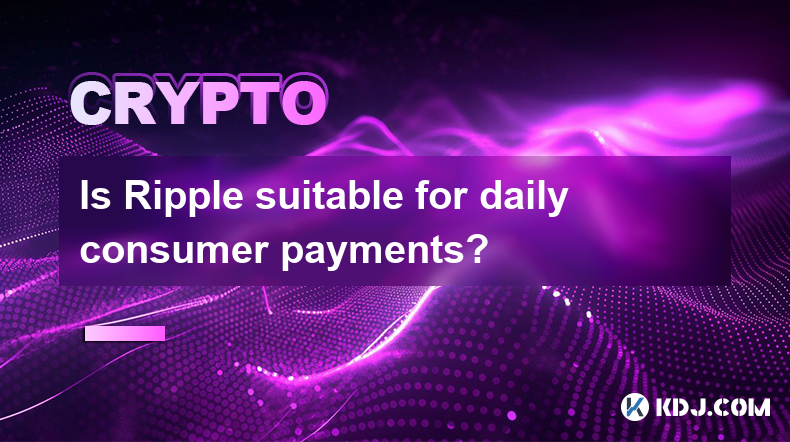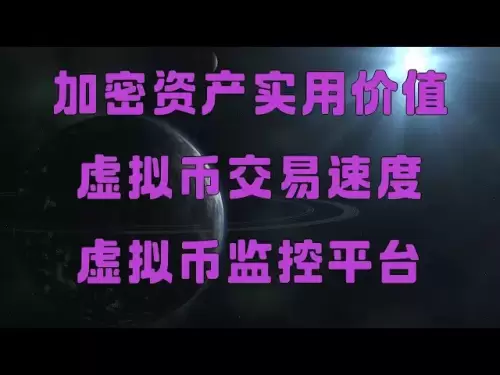-
 Bitcoin
Bitcoin $105,734.0170
-1.51% -
 Ethereum
Ethereum $2,414.7328
-3.26% -
 Tether USDt
Tether USDt $1.0002
0.00% -
 XRP
XRP $2.1748
-2.62% -
 BNB
BNB $647.5663
-1.72% -
 Solana
Solana $148.1710
-3.81% -
 USDC
USDC $0.9999
-0.01% -
 TRON
TRON $0.2799
-0.02% -
 Dogecoin
Dogecoin $0.1586
-4.17% -
 Cardano
Cardano $0.5440
-5.03% -
 Hyperliquid
Hyperliquid $37.0680
-6.59% -
 Bitcoin Cash
Bitcoin Cash $501.2052
-4.01% -
 Sui
Sui $2.6846
-3.47% -
 Chainlink
Chainlink $12.8488
-3.38% -
 UNUS SED LEO
UNUS SED LEO $8.9480
-1.51% -
 Avalanche
Avalanche $17.2059
-3.87% -
 Stellar
Stellar $0.2270
-4.75% -
 Toncoin
Toncoin $2.7889
-3.93% -
 Shiba Inu
Shiba Inu $0.0...01126
-1.76% -
 Litecoin
Litecoin $83.6893
-3.36% -
 Hedera
Hedera $0.1445
-4.49% -
 Monero
Monero $312.4014
-2.58% -
 Dai
Dai $1.0000
0.00% -
 Ethena USDe
Ethena USDe $1.0001
-0.01% -
 Polkadot
Polkadot $3.2920
-3.32% -
 Bitget Token
Bitget Token $4.4629
-1.81% -
 Uniswap
Uniswap $6.5386
-8.42% -
 Aave
Aave $260.3780
-6.01% -
 Pepe
Pepe $0.0...09308
-4.54% -
 Pi
Pi $0.4864
-3.04%
Is Ripple suitable for daily consumer payments?
Ripple's speed and low fees offer potential for daily payments, but volatility, regulatory uncertainty, and limited merchant adoption hinder widespread consumer use.
Mar 14, 2025 at 08:16 pm

Key Points:
- Ripple's speed and low transaction fees make it potentially suitable for daily payments, but widespread adoption faces hurdles.
- Scalability is a key advantage, but network effects and merchant acceptance are crucial for success.
- Volatility remains a concern for consumers, requiring stablecoin integration or other solutions.
- Regulatory uncertainty significantly impacts Ripple's viability for everyday transactions.
- Existing payment infrastructure and consumer habits present challenges to disruption.
Is Ripple Suitable for Daily Consumer Payments?
Ripple, with its native cryptocurrency XRP, aims to provide a faster, cheaper, and more efficient alternative to traditional cross-border payment systems. But is it suitable for everyday consumer payments? The answer is complex and depends on several factors. While Ripple's technology boasts impressive speed and low transaction costs, several hurdles stand in the way of widespread adoption for daily consumer use.
Speed and Transaction Fees:
One of Ripple's key strengths is its speed. Transactions can be processed in a matter of seconds, far faster than traditional banking systems or even some other cryptocurrencies. Furthermore, transaction fees are significantly lower, making it a potentially cost-effective solution for frequent, small-value payments. This speed and cost-effectiveness are essential for daily consumer transactions where speed and efficiency are highly valued.
Scalability and Network Effects:
Ripple's network is designed for high scalability, meaning it can handle a large volume of transactions simultaneously without significant performance degradation. This is a critical aspect for a system aiming to handle the massive transaction volume associated with daily consumer payments. However, scalability alone isn't enough. Network effects – the value derived from a large user base – are also vital. The more users and merchants that adopt Ripple, the more valuable it becomes.
Volatility and Stability:
A major challenge for using any cryptocurrency for daily payments is price volatility. The value of XRP, like other cryptocurrencies, can fluctuate significantly, creating uncertainty for both consumers and merchants. This volatility makes it difficult to predict the cost of goods and services, undermining the predictability essential for routine transactions. Integrating stablecoins pegged to fiat currencies could mitigate this issue, but their adoption is still in its early stages.
Regulatory Uncertainty:
Ripple faces significant regulatory uncertainty, particularly in the United States. The ongoing legal battle with the Securities and Exchange Commission (SEC) casts a long shadow over its future. Regulatory clarity is crucial for widespread adoption, as uncertainty can deter both consumers and businesses from using the system. Until regulatory issues are resolved, the future of Ripple for daily payments remains uncertain.
Existing Payment Infrastructure and Consumer Habits:
Consumers are accustomed to existing payment methods, such as credit cards, debit cards, and mobile payment apps. These systems are well-established and widely accepted, making it difficult for a new system like Ripple to gain traction. Overcoming ingrained consumer habits and integrating Ripple with existing infrastructure presents a significant challenge. Education and user-friendly interfaces are essential for successful adoption.
Merchant Acceptance:
For daily consumer payments to be practical, merchants need to accept Ripple. While some businesses already accept cryptocurrency payments, widespread merchant acceptance is crucial for Ripple to become a viable daily payment option. Encouraging merchant adoption requires incentives, user-friendly payment processing systems, and addressing concerns about price volatility and regulatory uncertainty.
Technological Integration:
Integrating Ripple into existing point-of-sale (POS) systems and other payment infrastructure is another hurdle. This requires collaboration with payment processors and retailers to ensure seamless integration and a smooth user experience. Without easy integration, consumers are unlikely to adopt a new payment system, however efficient it might be.
Security Concerns:
Like all cryptocurrency systems, Ripple's security is crucial. Any vulnerabilities could expose users to fraud and theft, undermining consumer trust. Robust security measures are essential to ensure the safety and reliability of the system, thereby building confidence in its use for daily transactions. Addressing potential security concerns transparently and proactively is vital for widespread adoption.
International Payments:
While Ripple's strength lies in cross-border payments, its suitability for daily domestic transactions within a single country is less clear. The existing infrastructure for domestic payments is often robust and established, making it challenging for Ripple to compete effectively. However, within regions with underdeveloped or inefficient payment systems, Ripple might find a niche.
Frequently Asked Questions:
Q: Is XRP volatile?
A: Yes, XRP, like most cryptocurrencies, experiences price volatility. This is a significant concern for its use in daily transactions where price stability is crucial.
Q: Is Ripple regulated?
A: Ripple's regulatory status is uncertain, particularly in the US, due to ongoing legal battles. This uncertainty hinders its widespread adoption.
Q: How fast are Ripple transactions?
A: Ripple transactions are significantly faster than traditional banking systems, often completing in seconds.
Q: Are there transaction fees?
A: Yes, but they are generally lower than traditional banking fees.
Q: How secure is Ripple?
A: Ripple employs security measures to protect against fraud and theft, but like any system, it's not entirely immune to risk.
Q: Do merchants accept Ripple?
A: Merchant adoption is still limited, although some businesses do accept cryptocurrency payments, including XRP.
Disclaimer:info@kdj.com
The information provided is not trading advice. kdj.com does not assume any responsibility for any investments made based on the information provided in this article. Cryptocurrencies are highly volatile and it is highly recommended that you invest with caution after thorough research!
If you believe that the content used on this website infringes your copyright, please contact us immediately (info@kdj.com) and we will delete it promptly.
- Crypto Trends 2025: MAGACOIN FINANCE Surges, Ethereum Mining Evolves, and XRP Payouts Innovate
- 2025-07-02 10:30:12
- Ethereum, MAGACOIN FINANCE, and Inflation: A Shift in Crypto Investor Focus
- 2025-07-02 10:30:12
- Kangaroos, Coin Purses, and a Hop Through Money History: You Gotta See This!
- 2025-07-02 10:50:15
- Arbitrum, Robinhood, and ARB Price: Is a Rebound on the Horizon?
- 2025-07-02 10:50:15
- Michael Saylor, Bitcoin, and $500 Million: A Winning Strategy?
- 2025-07-02 08:30:12
- Toncoin's Telegram Takeover: Price Predictions and the Power of Utility
- 2025-07-02 09:10:12
Related knowledge

How to customize USDT TRC20 mining fees? Flexible adjustment tutorial
Jun 13,2025 at 01:42am
Understanding USDT TRC20 Mining FeesMining fees on the TRON (TRC20) network are essential for processing transactions. Unlike Bitcoin or Ethereum, where miners directly validate transactions, TRON uses a delegated proof-of-stake (DPoS) mechanism. However, users still need to pay bandwidth and energy fees, which are collectively referred to as 'mining fe...

USDT TRC20 transaction is stuck? Solution summary
Jun 14,2025 at 11:15pm
Understanding USDT TRC20 TransactionsWhen users mention that a USDT TRC20 transaction is stuck, they typically refer to a situation where the transfer of Tether (USDT) on the TRON blockchain has not been confirmed for an extended period. This issue may arise due to various reasons such as network congestion, insufficient transaction fees, or wallet-rela...

How to cancel USDT TRC20 unconfirmed transactions? Operation guide
Jun 13,2025 at 11:01pm
Understanding USDT TRC20 Unconfirmed TransactionsWhen dealing with USDT TRC20 transactions, it’s crucial to understand what an unconfirmed transaction means. An unconfirmed transaction is one that has been broadcasted to the blockchain network but hasn’t yet been included in a block. This typically occurs due to low transaction fees or network congestio...

How to check USDT TRC20 balance? Introduction to multiple query methods
Jun 21,2025 at 02:42am
Understanding USDT TRC20 and Its ImportanceUSDT (Tether) is one of the most widely used stablecoins in the cryptocurrency market. It exists on multiple blockchain networks, including TRC20, which operates on the Tron (TRX) network. Checking your USDT TRC20 balance accurately is crucial for users who hold or transact with this asset. Whether you're sendi...

What to do if USDT TRC20 transfers are congested? Speed up trading skills
Jun 13,2025 at 09:56am
Understanding USDT TRC20 Transfer CongestionWhen transferring USDT TRC20, users may occasionally experience delays or congestion. This typically occurs due to network overload on the TRON blockchain, which hosts the TRC20 version of Tether. Unlike the ERC20 variant (which runs on Ethereum), TRC20 transactions are generally faster and cheaper, but during...

The relationship between USDT TRC20 and TRON chain: technical background analysis
Jun 12,2025 at 01:28pm
What is USDT TRC20?USDT TRC20 refers to the Tether (USDT) token issued on the TRON blockchain using the TRC-20 standard. Unlike the more commonly known ERC-20 version of USDT (which runs on Ethereum), the TRC-20 variant leverages the TRON network's infrastructure for faster and cheaper transactions. The emergence of this version came as part of Tether’s...

How to customize USDT TRC20 mining fees? Flexible adjustment tutorial
Jun 13,2025 at 01:42am
Understanding USDT TRC20 Mining FeesMining fees on the TRON (TRC20) network are essential for processing transactions. Unlike Bitcoin or Ethereum, where miners directly validate transactions, TRON uses a delegated proof-of-stake (DPoS) mechanism. However, users still need to pay bandwidth and energy fees, which are collectively referred to as 'mining fe...

USDT TRC20 transaction is stuck? Solution summary
Jun 14,2025 at 11:15pm
Understanding USDT TRC20 TransactionsWhen users mention that a USDT TRC20 transaction is stuck, they typically refer to a situation where the transfer of Tether (USDT) on the TRON blockchain has not been confirmed for an extended period. This issue may arise due to various reasons such as network congestion, insufficient transaction fees, or wallet-rela...

How to cancel USDT TRC20 unconfirmed transactions? Operation guide
Jun 13,2025 at 11:01pm
Understanding USDT TRC20 Unconfirmed TransactionsWhen dealing with USDT TRC20 transactions, it’s crucial to understand what an unconfirmed transaction means. An unconfirmed transaction is one that has been broadcasted to the blockchain network but hasn’t yet been included in a block. This typically occurs due to low transaction fees or network congestio...

How to check USDT TRC20 balance? Introduction to multiple query methods
Jun 21,2025 at 02:42am
Understanding USDT TRC20 and Its ImportanceUSDT (Tether) is one of the most widely used stablecoins in the cryptocurrency market. It exists on multiple blockchain networks, including TRC20, which operates on the Tron (TRX) network. Checking your USDT TRC20 balance accurately is crucial for users who hold or transact with this asset. Whether you're sendi...

What to do if USDT TRC20 transfers are congested? Speed up trading skills
Jun 13,2025 at 09:56am
Understanding USDT TRC20 Transfer CongestionWhen transferring USDT TRC20, users may occasionally experience delays or congestion. This typically occurs due to network overload on the TRON blockchain, which hosts the TRC20 version of Tether. Unlike the ERC20 variant (which runs on Ethereum), TRC20 transactions are generally faster and cheaper, but during...

The relationship between USDT TRC20 and TRON chain: technical background analysis
Jun 12,2025 at 01:28pm
What is USDT TRC20?USDT TRC20 refers to the Tether (USDT) token issued on the TRON blockchain using the TRC-20 standard. Unlike the more commonly known ERC-20 version of USDT (which runs on Ethereum), the TRC-20 variant leverages the TRON network's infrastructure for faster and cheaper transactions. The emergence of this version came as part of Tether’s...
See all articles

























































































